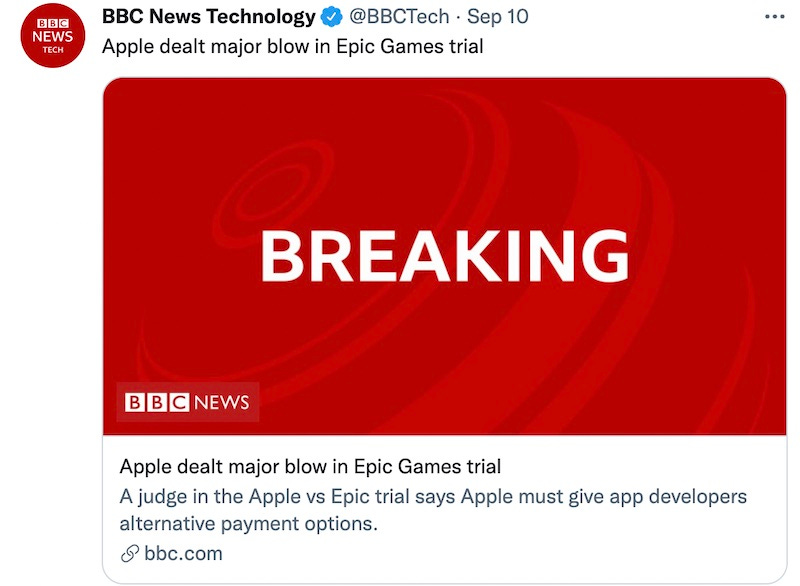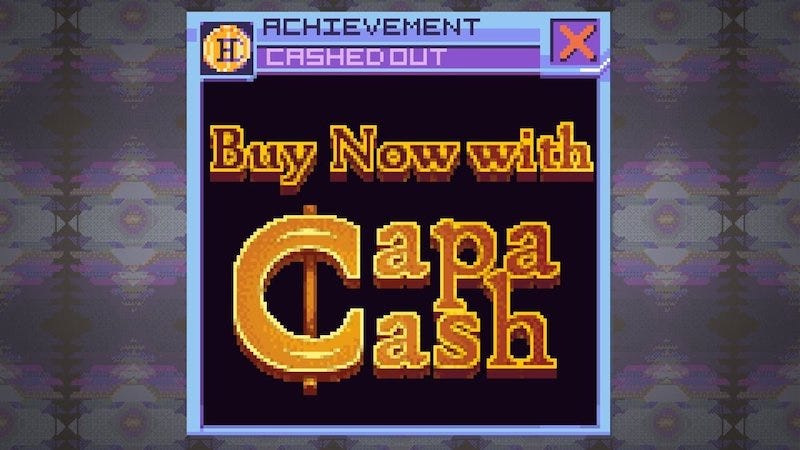Trending
Opinion: How will Project 2025 impact game developers?
The Heritage Foundation's manifesto for the possible next administration could do great harm to many, including large portions of the game development community.

Featured Blog | This community-written post highlights the best of what the game industry has to offer. Read more like it on the Game Developer Blogs or learn how to Submit Your Own Blog Post
There’s been plenty of 'hot takes' on its ramifications being delivered regularly throughout the weekend. And even now, I’m not sure what it really means. So that’s what we’re going to talk about!

[The GameDiscoverCo game discovery newsletter is written by 'how people find your game' expert & GameDiscoverCo founder Simon Carless, and is a regular look at how people discover and buy video games in the 2020s.]
Welcome back to the GameDiscoverCo newsletter for the week, folks. And it's probably not surprising to you that we'd start with the Epic/Apple U.S. antitrust lawsuit verdict, which was delivered on Friday.
There's been plenty of 'hot takes' on its ramifications being delivered regularly throughout the weekend. And even now, I'm not sure what it really means. So that's what we're going to talk about! (It's our traditional 'lukewarm take' format.)

As soon as the U.S. judge's order was filed on Friday, you saw breaking news alerts like the one above from the BBC, trumpeting a 'major blow' to Apple. And indeed, U.S. District Court judge Yvonne Gonzalez Rogers had ruled against Apple in one notable 'anti-steering' area of the suit.
So, some background: you can read some of GameDiscoverCo's key coverage of the original trial allegations, and the CourtListener website has legal documents from the trial, including the full 180-page order [PDF link] with the judge's detailed comments on all of the (many!) Epic allegations.
And I don't want to repeat some of the excellent recaps of the trial verdict. In particular, The Verge's Adi Robertson has an excellent breakdown, filed late into the weekend, on what the entire thing means and doesn't mean. There's also an absolutely epic two and a half hour video from lawyer Richard Hoeg, if you have a spare afternoon:
But I'm guessing you don't have a spare afternoon, and you want GameDiscoverCo to break it down for you, from a 'game dev/platform' perspective? You've got it. Here's what we think happened:
The vast majority of Epic's allegations were rejected. If you've read the entire order, you'll note the large amount of allegations rejected, including all 9 under the famous anti-monopolistic Sherman Act. It was only under the final count, via California's Unfair Competition Law, that the judge agreed with one aspect. This just wasn't a great result for Epic - even if the 'alternative payments' win could be useful for other devs.
The judge wasn't very happy with Epic's 'all guns blazing' attitude: the judge ruled that Epic broke their App Store contract unrepetently, and makes a couple of references to the company's size and profitability. And she noted in her conclusion on Apple's aggressive attitude: "Ultimately, Epic Games overreached. As a consequence, the trial record was not as fulsome with respect to antitrust conduct in the relevant market as it could have been."
But she wasn't a massive Apple fan either: in as much as you can read Judge Gonzalez Rogers' disdain, it comes through in comments like this on App Store profit: "As described, the commission rate driving the excessive margins has not been justified. Crossreference to a historic gamble made over a decade ago is insufficient. Nor can Apple hide behind its self-created web of interlocking rules, regulations, and generic intellectual property claims; or the lack of transparency among various businesses to feign innocence." Ouch.
The court was never likely to open up app stores or change percentage cuts: perhaps some hopeful viewers were hoping for wide-ranging rulings. Epic was certainly hoping to be able to set up its own App Store on iOS. But the judge hints as to why such radical things weren't done - her proposed anti-steering solution "does not require the Court to micromanage business operations which courts are not well-suited to do as the Supreme Court has appropriately recognized." (If you try to get a court to micromanage Apple's OS, the U.S. Supreme Court would reject. I believe that.)
And here is the actual fall-out from the case in practical terms:
Epic gets a very specific fine, and doesn't have to pay legal costs: the judge found Epic liable for 30% of the $12 million in iOS Epic-direct payments made until October 2020 - and 30% of any more recent revenue - since the contract signed with Apple says they owe it. Fair enough. (But the judge is not making Epic pay Apple's legal bills - which was requested by Apple, and would have been a pretty substantial sum.)
Apple can stop working with other Epic subsidiaries at any time. there was an injunction in late 2020 stopping this, but now: "Apple has the contractual right to terminate its DPLA with any or all of Epic Games' wholly owned subsidiaries, affiliates, and/or other entities under Epic Games' control at any time and at Apple's sole discretion." This could be a middleware headache for Unreal Engine and its clients. But we're not sure Apple wants to look punitive against Epic at this time.
Fortnite won't go back on the App Store, unless Epic agrees to Apple's conditions. Which seems unlikely at this point, right? Especially given that Epic already filed an appeal over the suit, and it asked to reappear on the South Korean App Store after the 'alternate in-app payment systems' legal ruling and was denied. Plus, it looks like Apple is thinking about whether it wants to appeal - which is understandable, if you read on to the next paragraph.
In 90 days, iOS apps can link to other purchase mechanisms & sign-up methods. Here's the exact wording of the 'one big thing': "Apple [is] hereby permanently restrained and enjoined from prohibiting developers from (i) including in their apps and their metadata buttons, external links, or other calls to action that direct customers to purchasing mechanisms, in addition to In-App Purchasing and (ii) communicating with customers through points of contact obtained voluntarily from customers through account registration within the app."
The way Judge Gonzalez Rogers decided to phrase things was to take a particular clause in Apple's app guidelines said you couldn't do, and say 'actually, now app developers can do that!' The wording is Apple's own, just reversed. She felt this opens up the market further without 'upsetting the applecart'. (Point ii was partially agreed to by Apple in a separate settlement a few weeks back, btw.)

What's next? Good question. Well - it's up to Apple and how it decides to act before the ruling goes into effect (presuming it doesn't appeal.) And it's not necessarily as clear-cut as you might think. For example, you can find smart people like Richard Hoeg (above legal video) and various Internet commenters on HackerNews noting that Apple might still be entitled to its 30% cut, even on IAP processed by third parties.
However, it's just not clear how Apple would track or collect that revenue - or even if they will seek to monitor it in some way, or just concede. (The company has government investigations and lawsuits pending all over the world. And allowing competing App Stores on iOS is potentially a way worse fate for them than 'opening up clunky web browser interfaces for alternative payments'.)
And as for how F2P game publishers and devs will react - we haven't yet seen what other incentives they might dream up to get players to switch payment mechanisms. (Exclusive characters? In-game currency? Discounts? Etc.) Converting even the top 1% of iOS gamers - who spend an average of $2,700 annually - to a lower-cost IAP platform is clearly worth it for game creators in this space.
Was this really the end result that Epic wanted when it started its trial? It's managed to open up an anticompetitive payment loophole that may cost Apple hundreds of millions of dollars. But that won't get Fortnite back on iOS, or allow Epic to set up its own iOS App Store to 'reduce prices for players' - its stated 'Project Liberty' goal.
And on Tim Sweeney's much loved 12% platform cut - sure, Judge Gonzalez Rogers did specifically say she thought a 30% store cut was unfair and negatively impacts developers. And the judge's solution removes barriers which many thought were unfair. But it also generates all kinds of new complexities. None of these complexities will benefit Epic, some could benefit large-company margins, yet few will benefit actual end users, in our view.
Plus, this may increase confusion and perhaps even off-App Store scams of the 'how many times am I getting billed now?' splintered payment method type. (Here comes the fleeceware!) But heck, we're the premium PC/console game newsletter, so did you expect us to be excited about this particular outcome? Oh well…
[We're GameDiscoverCo, a new agency based around one simple issue: how do players find, buy and enjoy your premium PC or console game? You can subscribe to GameDiscoverCo Plus to get access to exclusive newsletters, eBook and a Discord, plus interactive daily rankings of every unreleased Steam game, and more besides.]
Read more about:
Featured BlogsYou May Also Like